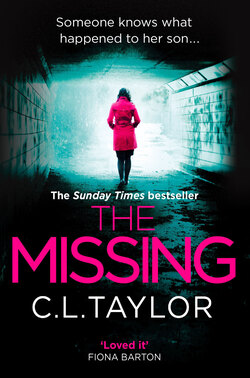Читать книгу The Missing - C.L. Taylor, C.L. Taylor, C. L. Taylor - Страница 11
Chapter 4
ОглавлениеIt’s a small conference room, tucked away in the basement of the town hall with a strip light buzzing overhead and no natural light. It’s a quarter of the size of the one where we made our first appeal for Billy, forty-eight hours after we reported him missing. Unlike that first appeal, when every single one of the plastic-backed chairs in the rows opposite us were filled, there are only half a dozen journalists and photographers present. Most of them are fiddling with their phones. They glance up as we file in with DS Forbes, then look back down again. A couple of them begin scribbling in their notebooks.
Mrs Wilkinson looks sombre in a pale grey jumper and trouser ensemble whilst Mr Wilkinson looks surly and distracted in a dark suit, the leg of his trousers stained with what looks like dirt or oil.
I have no idea if that’s what they’ve written. I’ll find out tomorrow, I imagine. I can’t bear to read the papers, particularly not the online versions with the horrible, judgemental comments at the bottom, but I know Mark will. He’ll pore over them, growling and swearing and mumbling about ‘the bloody idiot public’.
I didn’t know what a double-edged sword media attention would be back when Billy disappeared. I was desperate for them to publish our story – we both were, the more attention Billy’s story got the better – but I couldn’t have prepared myself for the barrage of speculation and judgement that came with it. I looked pale and distraught, those were the words most of the reporters used to describe me during that first press conference. Mark was described as cold and reserved. He wasn’t reserved – he was bloody terrified, we both were. But while I quaked, twisting my fingers together under the desk, Mark sat still, straight-backed, his hands on his knees and his eyes fixed on the large ornate clock on the opposite wall. At one point I reached for his hand and wrapped my fingers around his. He didn’t so much as glance at me until he’d delivered his appeal. At the time I felt desperately hurt but later, in the privacy of our living room, he explained that, as much as he’d wanted to comfort me, he hadn’t been able to.
‘You know I compartmentalize to deal with stress,’ he said. ‘And I needed to deliver my appeal without breaking down. If I’d have touched you, if I’d so much as looked at you I would have crumbled. And I couldn’t do that, not when what I had to say was so important. You can understand that. Can’t you?’
I could and I couldn’t, but I envied his ability to shut out the thoughts and feelings he didn’t want to deal with. My emotions can’t be shut into boxes in my head. They’re as tangled and jumbled as the strands of thread in the bottom of my grandmother’s embroidery basket. And the one thought that runs through everything, the strand that is wrapped around my heart is, Where is Billy?
‘Claire?’ DS Forbes says. ‘They’re ready for your statement now.’
A television camera has appeared in the aisle that runs between the lines of plastic-backed chairs. The lens is trained on my face. We decided some weeks ago that I should be the one to make this appeal.
‘The public respond more favourably when the mother does it,’ DS Forbes said. He made no mention of the horrible comments that had appeared online when Mark made the last appeal six months ago. Comments like: You can tell the father’s behind it. He’s not showing any emotion and I bet you money it was the dad. It always is.
‘Ready?’ DS Forbes says again and this time I sit up straighter in my chair and take a deep breath in through my nose. I can smell DS Forbes’s aftershave and the faintest scent of motor oil emanating from Mark, who’s sitting on the other side of me. I can sense him watching me, but I don’t turn to look at him before I pick up the prepared statement on the desk in front of me. I can do this. I no longer need a hand on my knee.
‘Six months ago today,’ I say, looking straight into the camera lens, ‘on Thursday the fifth of February, my younger son Billy disappeared from our home in Knowle, South Bristol, in the early hours of the morning. He was only fifteen. He took his schoolbag and his mobile phone and he was probably dressed in jeans, Nike trainers, a black Superdry jacket and an NYC baseball hat …’ I falter, aware that some of the journalists are twisting round in their seats, no longer scribbling in their notebooks. Mark, beside me, makes a low noise in the base of his throat and DS Forbes leans forward and puts his elbows on the desk. ‘We all miss Billy very much. His disappearance has left a hole in our family that nothing can fill and …’ I keep my eyes trained on the camera but I’m aware of a commotion at the back of the room. One man is wrestling with another in the doorway. ‘Billy, if you’re watching, please get in touch. We love you very, very much and nothing can change that. If you don’t want to ring us directly, please just walk into the nearest police station or get in touch with one of your friends.’
The producer standing next to the cameraman taps him on the shoulder and signals towards the back of the room. The camera twists away from me and a shout emanates from the doorway.
‘Get off me! I’ve got a right to be here! I’ve got a right to speak.’
